Guilie Castillo-Oriard's Blog, page 14
April 4, 2015
Days in Curaçao (#AtoZChallenge 2015)
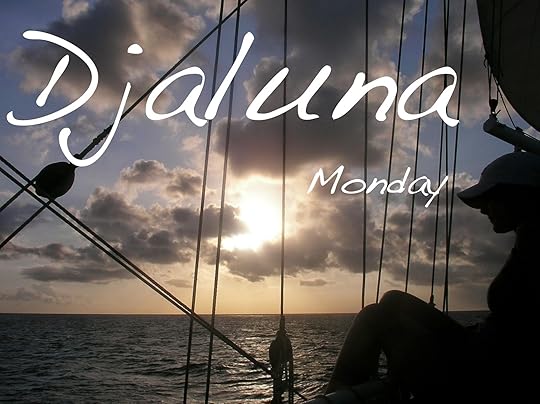 [dja-LOO-nah]
[dja-LOO-nah](The [dja] sound is like the [ja] in Jack, jasmine, jazz, or janitor.)
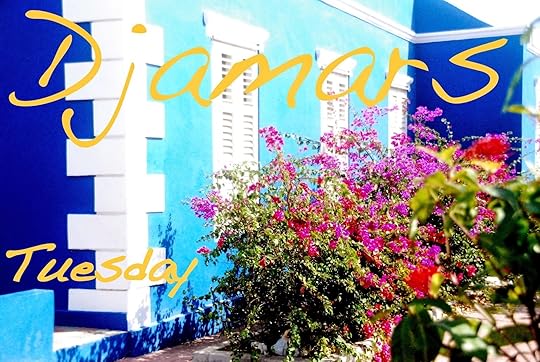 [dja-MARS]
[dja-MARS]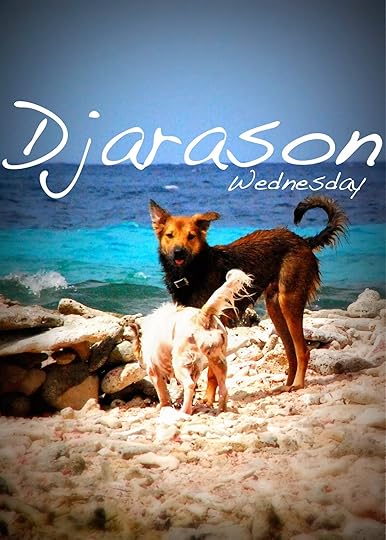 [dja-rah-SOHN]
[dja-rah-SOHN]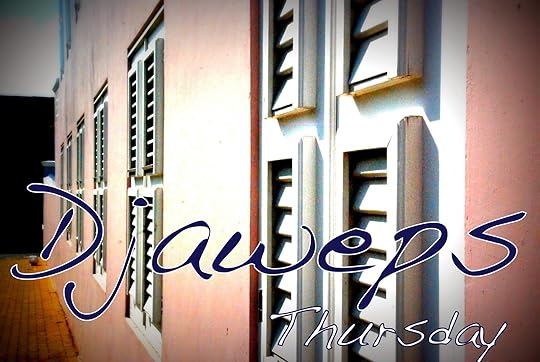 [dja-WEBS]
[dja-WEBS]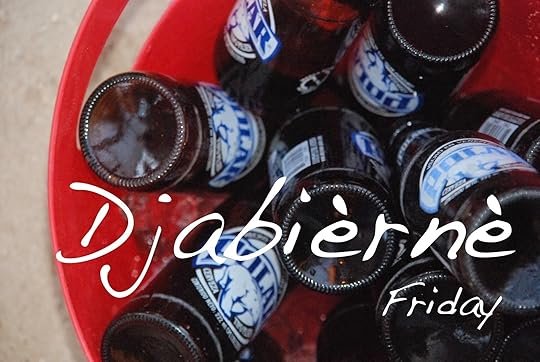 [dja-BEE-EHR-neh]
[dja-BEE-EHR-neh]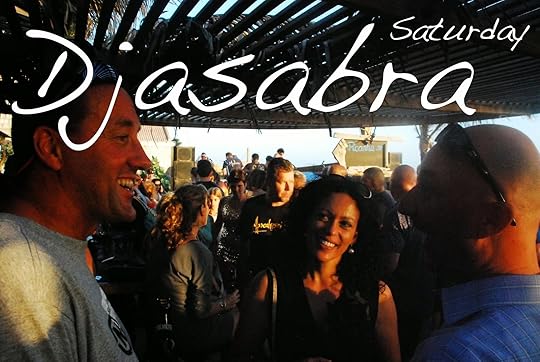 [dja-SAB-rah]
[dja-SAB-rah] [dja-doo-MEEN-goo]
[dja-doo-MEEN-goo]
Published on April 04, 2015 21:01
Choller (#AtoZChallenge 2015)
(Bit late with my C post, I know. I'll catch up, I promise.)
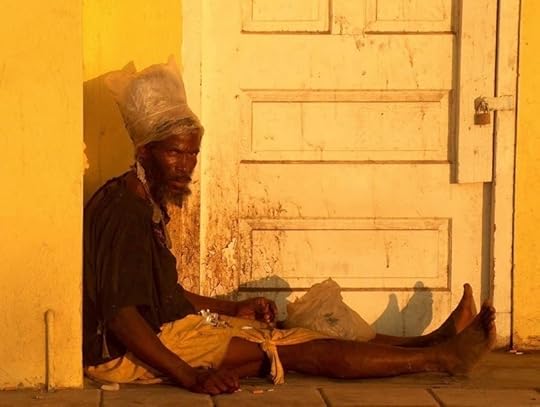 A choller at sunset.
A choller at sunset.
(Image source)Vagabond. Bum. Homeless person. Urchin. Junkie. Which certainly aren't exclusive of Curaçao, and actually aren't even all that ubiquitous here. (I'd rather be homeless in the tropics than in, say, Michigan. Or New York. But maybe that's just me.)
 What is unique to Curaçao is the verb. Chollering. I choller, you choller--or, like that famous phrase from You Know You've Lived in Curaçao If:
What is unique to Curaçao is the verb. Chollering. I choller, you choller--or, like that famous phrase from You Know You've Lived in Curaçao If:
"... if you've ever chollered something."
A choller, because of his/her lifestyle of little (physical) baggage, has few needs. Clothing is worn until it falls apart, shoes are totally optional, haircuts unnecessary. Because of the drugs, even food isn't a must.
But drugs are. And they cost money.
They do odd jobs, if they find them--and if their health allows it; sadly, most have some kind of mental disorder, whether drug-induced or otherwise. Sometimes they beg. But their most reliable source of income is chollering.
At a construction site, a few bricks might go missing. A cellphone left unattended at a sidewalk cafe table might not last long. A pair of shoes left on a beach might not be there when you get back. Clothes set out to dry on a line too close to the street, or in a yard unprotected by dogs, might disappear. (And your favorite t-shirt show up later on the back of your neighborhood choller.)
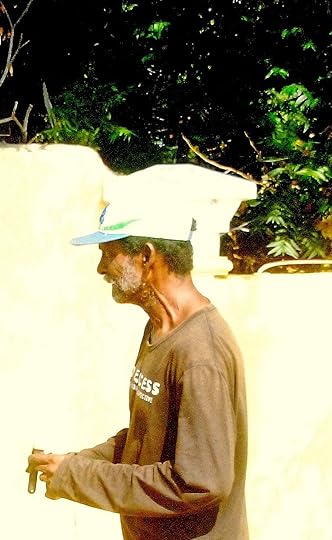 Stealing, yes. But at a small-scale, opportunistic level. Something like purloin, I suppose. A car doesn't get chollered, nor does a TV or a car stereo. Pick-pocketing wouldn't be chollering, either.
Stealing, yes. But at a small-scale, opportunistic level. Something like purloin, I suppose. A car doesn't get chollered, nor does a TV or a car stereo. Pick-pocketing wouldn't be chollering, either.
But, as my fantastic friend Yolanda Wiel explained, "say a small business--handmade furniture, for instance--uses "I'm Living It" as a slogan. They've chollered that from McDonald's."
(If I didn't quote Yolanda, I'd be chollering this explanation.)
 A choller at sunset.
A choller at sunset.(Image source)Vagabond. Bum. Homeless person. Urchin. Junkie. Which certainly aren't exclusive of Curaçao, and actually aren't even all that ubiquitous here. (I'd rather be homeless in the tropics than in, say, Michigan. Or New York. But maybe that's just me.)
 What is unique to Curaçao is the verb. Chollering. I choller, you choller--or, like that famous phrase from You Know You've Lived in Curaçao If:
What is unique to Curaçao is the verb. Chollering. I choller, you choller--or, like that famous phrase from You Know You've Lived in Curaçao If:"... if you've ever chollered something."
A choller, because of his/her lifestyle of little (physical) baggage, has few needs. Clothing is worn until it falls apart, shoes are totally optional, haircuts unnecessary. Because of the drugs, even food isn't a must.
But drugs are. And they cost money.
They do odd jobs, if they find them--and if their health allows it; sadly, most have some kind of mental disorder, whether drug-induced or otherwise. Sometimes they beg. But their most reliable source of income is chollering.
At a construction site, a few bricks might go missing. A cellphone left unattended at a sidewalk cafe table might not last long. A pair of shoes left on a beach might not be there when you get back. Clothes set out to dry on a line too close to the street, or in a yard unprotected by dogs, might disappear. (And your favorite t-shirt show up later on the back of your neighborhood choller.)
 Stealing, yes. But at a small-scale, opportunistic level. Something like purloin, I suppose. A car doesn't get chollered, nor does a TV or a car stereo. Pick-pocketing wouldn't be chollering, either.
Stealing, yes. But at a small-scale, opportunistic level. Something like purloin, I suppose. A car doesn't get chollered, nor does a TV or a car stereo. Pick-pocketing wouldn't be chollering, either.But, as my fantastic friend Yolanda Wiel explained, "say a small business--handmade furniture, for instance--uses "I'm Living It" as a slogan. They've chollered that from McDonald's."
(If I didn't quote Yolanda, I'd be chollering this explanation.)
Published on April 04, 2015 08:44
April 1, 2015
Banda Ariba & Banda Abou (#AtoZchallenge 2015)
"Take the highway north for five miles, then take the exit to the east and follow that road south for three blocks..."
... said no one in Curaçao, ever.
 The best beaches, the best diving, favorite BBQ spots, moonscapes where ocean meets cliff in spectacular explosion...
The best beaches, the best diving, favorite BBQ spots, moonscapes where ocean meets cliff in spectacular explosion...
It's all in Banda Abou.
In Curaçao, the only directions you need are upwards and downwards. Banda a riba and banda a bou. (Banda means side.)
"Ah," thought I when I first got here, freshly imported from the lands of "up North" and "down South". "That makes sense."
But it didn't.
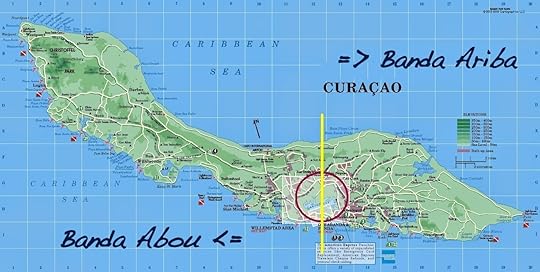 Meet Curaçao.
Meet Curaçao.
Note, please, the small black arrow below where it says Caribbean Sea. See it? That points North. The red circle is the urban area of Willemstad, glorious capital (and only city) of the island. Anything outside the urban area and to the right of the yellow line--so anything to the east-southeast--is Banda Ariba (up). Anything to the left--north-northwest--is Banda Abou (down).
So, in Curaçao, one goes "down North" and, logically, "up South".
But there's good logic behind it. This is the land of the tradewinds. And the wind blows from--taah-daaah!--the East. Ariba. Upwind. The island is divided into the upwind side and downwind side.
 Taffelberg, the gorgeous residences of Spaanse Water & Jan Sofat,
Taffelberg, the gorgeous residences of Spaanse Water & Jan Sofat,
St Joris and the Jan Thiel dog beaches--and, most of all, peace and quiet...
It's all in off-the-beaten-path Banda Ariba.
My intuitive north=up theory? Dead in the water. (At least it's nice, clear, warm Caribbean water.)
... said no one in Curaçao, ever.
 The best beaches, the best diving, favorite BBQ spots, moonscapes where ocean meets cliff in spectacular explosion...
The best beaches, the best diving, favorite BBQ spots, moonscapes where ocean meets cliff in spectacular explosion...It's all in Banda Abou.
In Curaçao, the only directions you need are upwards and downwards. Banda a riba and banda a bou. (Banda means side.)
"Ah," thought I when I first got here, freshly imported from the lands of "up North" and "down South". "That makes sense."
But it didn't.
 Meet Curaçao.
Meet Curaçao.Note, please, the small black arrow below where it says Caribbean Sea. See it? That points North. The red circle is the urban area of Willemstad, glorious capital (and only city) of the island. Anything outside the urban area and to the right of the yellow line--so anything to the east-southeast--is Banda Ariba (up). Anything to the left--north-northwest--is Banda Abou (down).
So, in Curaçao, one goes "down North" and, logically, "up South".
But there's good logic behind it. This is the land of the tradewinds. And the wind blows from--taah-daaah!--the East. Ariba. Upwind. The island is divided into the upwind side and downwind side.
 Taffelberg, the gorgeous residences of Spaanse Water & Jan Sofat,
Taffelberg, the gorgeous residences of Spaanse Water & Jan Sofat,St Joris and the Jan Thiel dog beaches--and, most of all, peace and quiet...
It's all in off-the-beaten-path Banda Ariba.
My intuitive north=up theory? Dead in the water. (At least it's nice, clear, warm Caribbean water.)
Published on April 01, 2015 22:30
March 31, 2015
Ai No! (#AtoZChallenge 2015)
Ai no!
/Eye-NOH/**
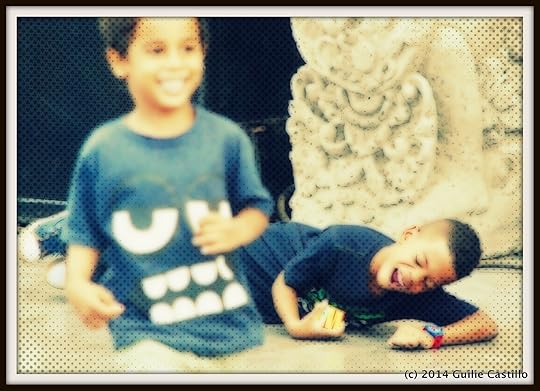
Literally "Oh no." Contextually, however, when it comes to Papiamentu words and expressions... there's more to translation than meets the Ai.
Your phone rings. It's your daughter, to tell you she took your car (without permission) and got into a fender-bender--with the front gate. You: "Ai no." (English: "You got to be kidding me.")
At the office water cooler, a colleague has everyone in stitches with a funny story. When the punch line comes, a chorus of "Ai no, swa*!" will most probably be heard. (English: "Love it!")
*more on swa on S day
Your best friend shows up at your coffee date in tears; she just broke up with her boyfriend. You: "Ai no, dushi." (English: "God, I'm so sorry.")
You've been standing in line at the tax office the whole day. Just as your turn comes up, finally, the teller announces the server is down and you need to come back tomorrow. You: "Ai no!" (English: "Un-freakin'-believable!")
Your sister-in-law mentions at a family dinner she's going to quit her job because her boss is too demanding: he gets upset if she takes two hours for lunch, or if she comes in late (9:30 instead of 8:00), or when she calls in sick (20 times so far this year). You: "Ai no." (English: "Seriously?" #facepalm)

**Phonetic spelling for English pronunciation
/Eye-NOH/**

Literally "Oh no." Contextually, however, when it comes to Papiamentu words and expressions... there's more to translation than meets the Ai.
Your phone rings. It's your daughter, to tell you she took your car (without permission) and got into a fender-bender--with the front gate. You: "Ai no." (English: "You got to be kidding me.")
At the office water cooler, a colleague has everyone in stitches with a funny story. When the punch line comes, a chorus of "Ai no, swa*!" will most probably be heard. (English: "Love it!")
*more on swa on S day
Your best friend shows up at your coffee date in tears; she just broke up with her boyfriend. You: "Ai no, dushi." (English: "God, I'm so sorry.")
You've been standing in line at the tax office the whole day. Just as your turn comes up, finally, the teller announces the server is down and you need to come back tomorrow. You: "Ai no!" (English: "Un-freakin'-believable!")
Your sister-in-law mentions at a family dinner she's going to quit her job because her boss is too demanding: he gets upset if she takes two hours for lunch, or if she comes in late (9:30 instead of 8:00), or when she calls in sick (20 times so far this year). You: "Ai no." (English: "Seriously?" #facepalm)

**Phonetic spelling for English pronunciation
Published on March 31, 2015 22:30
March 25, 2015
#AtoZChallenge 2015 Theme Reveal!
This April on Quiet Laughter it's all about Curaçao. More specifically, the vocabulary of Curaçao.
You may or may not know that Curaçao has its own language. Papiamentu. It's not a dialect but a language in its own right, and if you're going to spend any amount of time in Curaçao and expect it to be a happy time, you best get that straight.
But no, my A-to-Z series this year isn't a crash-course on Papiamentu (you can actually find those online). Instead, I've picked some of the most unique, most representative expressions that people use here... Things like dushi (which we've talked about before) or the confusion with the two meanings of sushi. The posts will be short and sweet, mostly, and will come with photographs... You see, like most languages, Papiamentu has a distinctive place-sourced feel to it. At least to me it does. More than teaching you a new word, I'd like to open a window, maybe even--if both you and I get lucky--a door, even for just a moment, to the world where the soul of these words resides.
I'm looking forward to it. I hope you are, too.
You may or may not know that Curaçao has its own language. Papiamentu. It's not a dialect but a language in its own right, and if you're going to spend any amount of time in Curaçao and expect it to be a happy time, you best get that straight.
But no, my A-to-Z series this year isn't a crash-course on Papiamentu (you can actually find those online). Instead, I've picked some of the most unique, most representative expressions that people use here... Things like dushi (which we've talked about before) or the confusion with the two meanings of sushi. The posts will be short and sweet, mostly, and will come with photographs... You see, like most languages, Papiamentu has a distinctive place-sourced feel to it. At least to me it does. More than teaching you a new word, I'd like to open a window, maybe even--if both you and I get lucky--a door, even for just a moment, to the world where the soul of these words resides.
I'm looking forward to it. I hope you are, too.
Published on March 25, 2015 17:11
March 5, 2015
E-communications: A Reality Check
A friend asked me for some help with a project he's working on, a few suggestions for short stories that might be apt for sparking a child's imagination. I'm not an expert--not even remotely--on children's literature, and I told him that, but he wasn't interested in the traditional stories for kids, so I agreed to come up with some ideas. I compiled a list--dove into my favorites, reread a few (some as a refresher, some just for the sheer pleasure they bring), checked to see whether they were available online somewhere, etc.--and emailed it to him.
And waited.
I wasn't sure how helpful I'd be... Whether my suggestions were PG-13 appropriate, whether they were too long or too short, whether they'd serve for the purpose he intended them. So, yes, I was kind of anxious to hear what he thought. After two days, I went to my inbox and did a global search: could I have missed his response? Could it have gone into the Spam folder? Had I sent it to the right address?
Everything checked out fine. And no, there was no reply.
Before pulling out my violin and climbing up to the rooftop to bemoan my friend's ingratitude in hauntingly melancholic tones (no drama queen here; I'm the freakin' empress), in a moment of enlightened maturity I decided to ask. "Hey. Did you get my email?"
What email, came the response.
Turns out the only way this dude checks his inbox is if you tell him you sent him an email. So I resent it, told him I'd resent it, and he confirmed he'd received it. Yay.
But it got me thinking. Email is a central part of my life. Email, Facebook, Whatsapp, Skype, the blog, social media in general--they're how I stay in touch with the world. Not just with friends and family; my critique group, my publisher, my journalism contacts. Even my dushi Skypes me when he's at the office.
This friend of mine, except for Facebook, uses none of the above.
Perhaps it's my ex-pat status. Or the fact I live in a small island no one's heard of. A large part of the people I speak to every day are too far away for face-to-face contact. But--again, the dushi-with-Skype example above. And it's not just him; most of my island friends are either on Whatsapp or Facebook (or both), and that's what we use to communicate.
So tell me, then. Am I weird? How do you communicate with your world? Do e-communications play a large part in your life? Are they a good thing? Or are we, in Fahrenheit-451-dystopia style, trading real contact for cyber-versions of ourselves?
And waited.
I wasn't sure how helpful I'd be... Whether my suggestions were PG-13 appropriate, whether they were too long or too short, whether they'd serve for the purpose he intended them. So, yes, I was kind of anxious to hear what he thought. After two days, I went to my inbox and did a global search: could I have missed his response? Could it have gone into the Spam folder? Had I sent it to the right address?
Everything checked out fine. And no, there was no reply.
Before pulling out my violin and climbing up to the rooftop to bemoan my friend's ingratitude in hauntingly melancholic tones (no drama queen here; I'm the freakin' empress), in a moment of enlightened maturity I decided to ask. "Hey. Did you get my email?"
What email, came the response.
Turns out the only way this dude checks his inbox is if you tell him you sent him an email. So I resent it, told him I'd resent it, and he confirmed he'd received it. Yay.
But it got me thinking. Email is a central part of my life. Email, Facebook, Whatsapp, Skype, the blog, social media in general--they're how I stay in touch with the world. Not just with friends and family; my critique group, my publisher, my journalism contacts. Even my dushi Skypes me when he's at the office.
This friend of mine, except for Facebook, uses none of the above.
Perhaps it's my ex-pat status. Or the fact I live in a small island no one's heard of. A large part of the people I speak to every day are too far away for face-to-face contact. But--again, the dushi-with-Skype example above. And it's not just him; most of my island friends are either on Whatsapp or Facebook (or both), and that's what we use to communicate.
So tell me, then. Am I weird? How do you communicate with your world? Do e-communications play a large part in your life? Are they a good thing? Or are we, in Fahrenheit-451-dystopia style, trading real contact for cyber-versions of ourselves?
Published on March 05, 2015 16:36
February 26, 2015
Colorless Tsukuru Tazaki -- Haruki Murakami (The B-Quotes Series)
I read this one, my second Murakami, back in January. Outstanding, beautiful book. Murakami is so hard to compare, even to himself... I read Kafka on The Shore last year, and while there's certainly a red thread unique to the author in, presumably, all his works, the beauty of each stands alone and singular.
Enjoy.
 Not everything was lost in the flow of time. [...] We truly believed in something back then, and we knew we were the kind of people capable of believing in something--with all our hearts. And that kind of hope will never simply vanish.
Not everything was lost in the flow of time. [...] We truly believed in something back then, and we knew we were the kind of people capable of believing in something--with all our hearts. And that kind of hope will never simply vanish.
[...] That if he intensely concentrated his feelings on one fixed point, like a lens focused on paper, bursting it into flames, his heart would suffer a fatal blow. More than anything he hoped for this. But months passed, and contrary to his expectations, his heart didn't stop. The heart apparently doesn't stop that easily.p. 377
Our lives are like a complex musical score, Tsukuru thought. Filled with all sorts of cryptic writing, sixteenth and thirty-second notes and other strange signs. It's next to impossible to correctly interpret these, and even if you could, and then could transpose them into the correct sounds, there's no guarantee that people would correctly understand, or appreciate, the meaning therein. No guarantee it would make people happy.
"[...] You don't lack anything. Be confident and be bold. That's all you need. Never let fear and stupid pride make you lose someone who's precious to you."p. 342
"We survived. You and I. And those who survive have a duty. Our duty is to do our best to keep on living. Even if our lives are not perfect."
p. 334
In reality, though, none of this ever happened. In reality something very different happened. And that fact was more significant now than anything else.p. 330
The beating of her heart kept time with the slap of the little boat against the pier.
"Important to me, perhaps. But maybe not to her. I came here to find that out.""It sounds kind of complicated.""Maybe too complicated for me to explain in English."Olga laughed. "Some things in life are too complicated to explain in any language."p. 270
It was a different sense of isolation from what he normally felt in Japan. And not such a bad feeling, he decided. Being alone in two senses of the word was maybe like a double negation of isolation. In other words, it made perfect sense for him, a foreigner, to feel isolated here. There was nothing odd about it at all. [...] He was in exactly the right place.
p. 272-273
Enjoy.
 Not everything was lost in the flow of time. [...] We truly believed in something back then, and we knew we were the kind of people capable of believing in something--with all our hearts. And that kind of hope will never simply vanish.
Not everything was lost in the flow of time. [...] We truly believed in something back then, and we knew we were the kind of people capable of believing in something--with all our hearts. And that kind of hope will never simply vanish.[...] That if he intensely concentrated his feelings on one fixed point, like a lens focused on paper, bursting it into flames, his heart would suffer a fatal blow. More than anything he hoped for this. But months passed, and contrary to his expectations, his heart didn't stop. The heart apparently doesn't stop that easily.p. 377
Our lives are like a complex musical score, Tsukuru thought. Filled with all sorts of cryptic writing, sixteenth and thirty-second notes and other strange signs. It's next to impossible to correctly interpret these, and even if you could, and then could transpose them into the correct sounds, there's no guarantee that people would correctly understand, or appreciate, the meaning therein. No guarantee it would make people happy.
"[...] You don't lack anything. Be confident and be bold. That's all you need. Never let fear and stupid pride make you lose someone who's precious to you."p. 342
"We survived. You and I. And those who survive have a duty. Our duty is to do our best to keep on living. Even if our lives are not perfect."
p. 334
In reality, though, none of this ever happened. In reality something very different happened. And that fact was more significant now than anything else.p. 330
The beating of her heart kept time with the slap of the little boat against the pier.
"Important to me, perhaps. But maybe not to her. I came here to find that out.""It sounds kind of complicated.""Maybe too complicated for me to explain in English."Olga laughed. "Some things in life are too complicated to explain in any language."p. 270
It was a different sense of isolation from what he normally felt in Japan. And not such a bad feeling, he decided. Being alone in two senses of the word was maybe like a double negation of isolation. In other words, it made perfect sense for him, a foreigner, to feel isolated here. There was nothing odd about it at all. [...] He was in exactly the right place.
p. 272-273
Published on February 26, 2015 05:25
February 23, 2015
Mexico is a proud nation today
At the Oscars last night, back-to-back Mexicans stepped up to the stage to receive little gold men.
On his third visit to the awards stage, for Best Movie, Iñarritu dedicated the award to the Mexican people: to those living in Mexico, he said he hoped we'd be able to build the kind of government we deserve, and to those living in the US, those of the newest generation of immigrants, he wished that they be treated with the same respect and recognition that others before them found in "this nation of immigrants."
Bravo, señores. You make us all proud.
The whole thing, from envelope opening (by Sean Penn, whose prelude to announcing the winner is priceless) and all of Iñarritu's speech, including a cute intermission by Michael Keaton, below. (Or you can just watch Iñarritu's bit about Mexico and Mexicans.)
And the Birdman trailer. Just because it's so fucking awesome.
On his third visit to the awards stage, for Best Movie, Iñarritu dedicated the award to the Mexican people: to those living in Mexico, he said he hoped we'd be able to build the kind of government we deserve, and to those living in the US, those of the newest generation of immigrants, he wished that they be treated with the same respect and recognition that others before them found in "this nation of immigrants."
Bravo, señores. You make us all proud.
The whole thing, from envelope opening (by Sean Penn, whose prelude to announcing the winner is priceless) and all of Iñarritu's speech, including a cute intermission by Michael Keaton, below. (Or you can just watch Iñarritu's bit about Mexico and Mexicans.)
And the Birdman trailer. Just because it's so fucking awesome.
Published on February 23, 2015 07:57
February 16, 2015
Karnaval! (2015 edition)
Karnaval (Carnival) in Curaçao is the event of the year. Half the island's 150K population participates in one way or another: either they're part of a 'walking' group (the groups that make up the parade), or they're involved in the costume design or the organization or providing assistance to the groups. And the other half is gathered on the sidewalks throughout Sunday afternoon and Tuesday evening to watch--and dance, and sing, and drink. I cannot imagine the amounts of beer that get consumed during the two days of Karnaval, but it's a lot.
I've been wanting to take photos of Karnaval for this blog for a while, but I can't seem to drum up enough energy to put myself through the crowds and the loud, loud music. And besides, much better photographers are, thankfully, present. Check out the Curaçao Images album on Flicker, and have a wild dance to celebrate Dushi Korsou!
I've been wanting to take photos of Karnaval for this blog for a while, but I can't seem to drum up enough energy to put myself through the crowds and the loud, loud music. And besides, much better photographers are, thankfully, present. Check out the Curaçao Images album on Flicker, and have a wild dance to celebrate Dushi Korsou!
Published on February 16, 2015 14:19
February 15, 2015
The Bone Clocks, David Mitchell (the B-Quotes Series)
I've been reading some really amazing, life-changing, perspective-altering books lately. Well, always, I suppose. But it recently struck me that most of the wisdom I find on the page, as powerful as it might feel to me at the moment of reading, will inevitably fall into oblivion. I make notes, sure; I have dozens of notebooks--big, small, tiny--scattered all over the house with quotes of exquisite truth jotted behind a grocery or a to-do list.
Like I said. Oblivion.
So I thought, why not put them into a blog post? With a clear label, they'll be easily retrievable at any time, anywhere.
I thus give to you the B-Quotes Series. And we begin with the wondrous turns of phrase, vocabulary choices, descriptions, and thoughts I found in The Bone Clocks by David Mitchell, read just last month.

"Love's pure free joy when it works, but when it goes bad you pay for the good hours at loan-shark prices."
p. 39
Power is lost or won, never created or destroyed. Power is a visitor to, not a possession of, those it empowers. [...] Power is crack-cocaine for your ego and battery-acid for your soul.
[...] and what's this prodding certainty that I'm in a labyrinth not only of turnings and doors but decisions and priorities [...]
p. 264
P.S. -- Have you seen my Facebook page? It's still a fledgling thing of wet wings and iffy sense of balance, which means it needs all the Likes you care to give ;) Once that first solo book of mine comes out later this year (more on that later), I'll be returning the love via giveaways and stuff :D
Like I said. Oblivion.
So I thought, why not put them into a blog post? With a clear label, they'll be easily retrievable at any time, anywhere.
I thus give to you the B-Quotes Series. And we begin with the wondrous turns of phrase, vocabulary choices, descriptions, and thoughts I found in The Bone Clocks by David Mitchell, read just last month.

"Love's pure free joy when it works, but when it goes bad you pay for the good hours at loan-shark prices."
p. 39
Power is lost or won, never created or destroyed. Power is a visitor to, not a possession of, those it empowers. [...] Power is crack-cocaine for your ego and battery-acid for your soul.
[...] and what's this prodding certainty that I'm in a labyrinth not only of turnings and doors but decisions and priorities [...]
p. 264
P.S. -- Have you seen my Facebook page? It's still a fledgling thing of wet wings and iffy sense of balance, which means it needs all the Likes you care to give ;) Once that first solo book of mine comes out later this year (more on that later), I'll be returning the love via giveaways and stuff :D
Published on February 15, 2015 12:40



